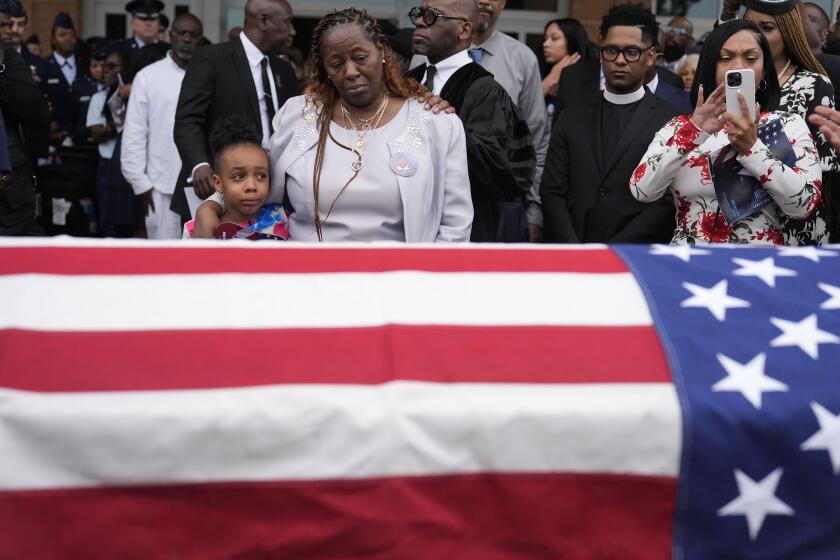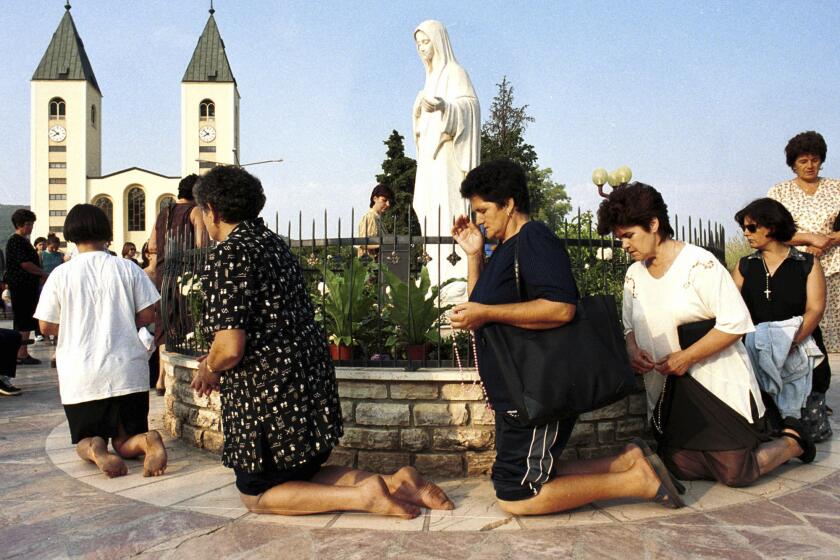Tribe Has Big Plans for Depressed Area : Development: The Coquilles envision bringing a gambling resort and other enterprises to the North Bend area of Oregon, a region suffering from the demise of the timber industry.
When the Coquille Indians won government recognition of their tribal status five years ago, new business opportunities opened for them.
The milestone has also raised hopes of better times for the North Bend-Coos Bay region where the Coquilles live, an area still suffering from the demise of the timber industry.
The Coquilles envision a new and diverse economy that includes a casino, retirement home, destination resort, industrial park, cranberry bogs, low-income housing and commercial timberlands.
The projects will bring a much needed commodity: work for the area’s residents.
“What we don’t have here are jobs that keep our younger educated people here. That is our greatest export,” said Loran Wiese, director of the Coos County Economic Development Department.
Since World War II, this region lived and died with the huge mills that peeled and ripped the big Douglas firs from the forests surrounding the bay into plywood and lumber.
Around the late 1970s, as housing starts declined, the big mills started closing. By the middle of the 1980s, 6,500 people--10% of the area’s population--had moved out, state labor economist John Anderson said. What’s left are a few smaller mills using high technology to turn out wood products, employing 1,800 people.
The fishing fleet suffered, too. Last year, commercial fishing for salmon was a bust amid concerns some runs were going extinct. More restrictions are being heaped on the groundfish and mid-water trawlers as well.
Enter Bruce Anderson, who grew up in Coos Bay while his schoolteacher mother fought to restore government recognition of the Coquille Tribe. Anderson left the area as a young man, played pro football for eight years and made his fortune in plastics. But, at the tribe’s request, he has returned to lead his people’s journey to prosperity.
Anderson now heads the Coquille Economic Development Corp., which is turning a former sawmill into a $25-million waterfront casino, hotel and family entertainment center.
Anderson has persuaded the tribe to think big, envisioning a chance to rejuvenate the entire Coos Bay-North Bend economy.
Although the track record is poor--97% of Indian businesses fail--the advantages are incredible, Anderson said.
As a sovereign nation, the tribe is exempt from local, state, and federal taxes, and can tap millions of dollars in government grants. It can pass on some of those advantages to business partners and tenants of its business park. For example, if a manufacturer hires 30 tribal members at $20,000 apiece, it can qualify for $12 million in cut-rate government financing.
“You have a 45% advantage starting out over anybody else,” Anderson said.
Last year, the tribe received $19 million in government grants and hopes to get as much this year.
Coquille Economic Development Corp. already has built Heritage Place in Bandon, a $6-million assisted living facility. It opened in January.
Bulldozers are roaring over a 400-acre industrial park and the site of 100 units of low-income housing for tribal members.
The tribe is negotiating with Monaco Coach of Junction City, a builder of high-end motor homes with sales of $107 million last year, to become the first tenant of the industrial park.
Full House Resorts, whose investors include former Chrysler Corp. Chairman Lee Iacocca, has sunk $16 million into the $25-million casino complex, scheduled to open with its initial facilities by June. Eventually it will have 800 gambling machines, three restaurants, a bingo hall, virtual reality theater, amusement park and hotel.
The tribe is also negotiating with the federal government to take over 56,000 acres of forest, which will produce logs for local mills and returns to the federal Treasury.
The first 10 acres of what they hope eventually will become 500 acres of cranberry bogs, which return $10,000 to $25,000 per acre, are ready for planting.
When it is all up and running, Anderson expects the various enterprises to generate $10 million a year, making the tribe economically self-sufficient while providing housing, health care and education as well as jobs for the entire community.
The tribe has run into opposition, both from local people who don’t like gambling and the Confederated Tribes of Coos, Lower Umpqua and Siuslaw Indians, which have plans for their own casino in Coos Bay.
“People hate change,” Anderson said. “And people are nervous about the Indians. I call it the cowboy mentality of a lot of people. We went out to bid on our health clinic. A $600,000 project. We got two bidders.
“Southwestern Oregon Community College went out for bid on a building about the same size. They got 11. Part of it is, ‘Gee, the tribe has this thing called sovereign immunity. What if they don’t pay us?’ ”
Joe Frazier, a director of Full House and former chief of community development for Westinghouse, watched the decline of the steel industry in Pittsburgh and sees some people in Coos Bay and North Bend hanging to the same kind of hope that the good old days someday will return. The casino has become a symbol of a past that is gone forever.
Wiese, head of the Coos County Economic Development Department, acknowledges that the tribe has taken a lot of people by surprise.
“To many people, that’s frustrating to see them going so hard and fast on this. The rest of us don’t have the means,” he said.
“I wouldn’t bet against them, at this point. No way.”
More to Read
Start your day right
Sign up for Essential California for news, features and recommendations from the L.A. Times and beyond in your inbox six days a week.
You may occasionally receive promotional content from the Los Angeles Times.






